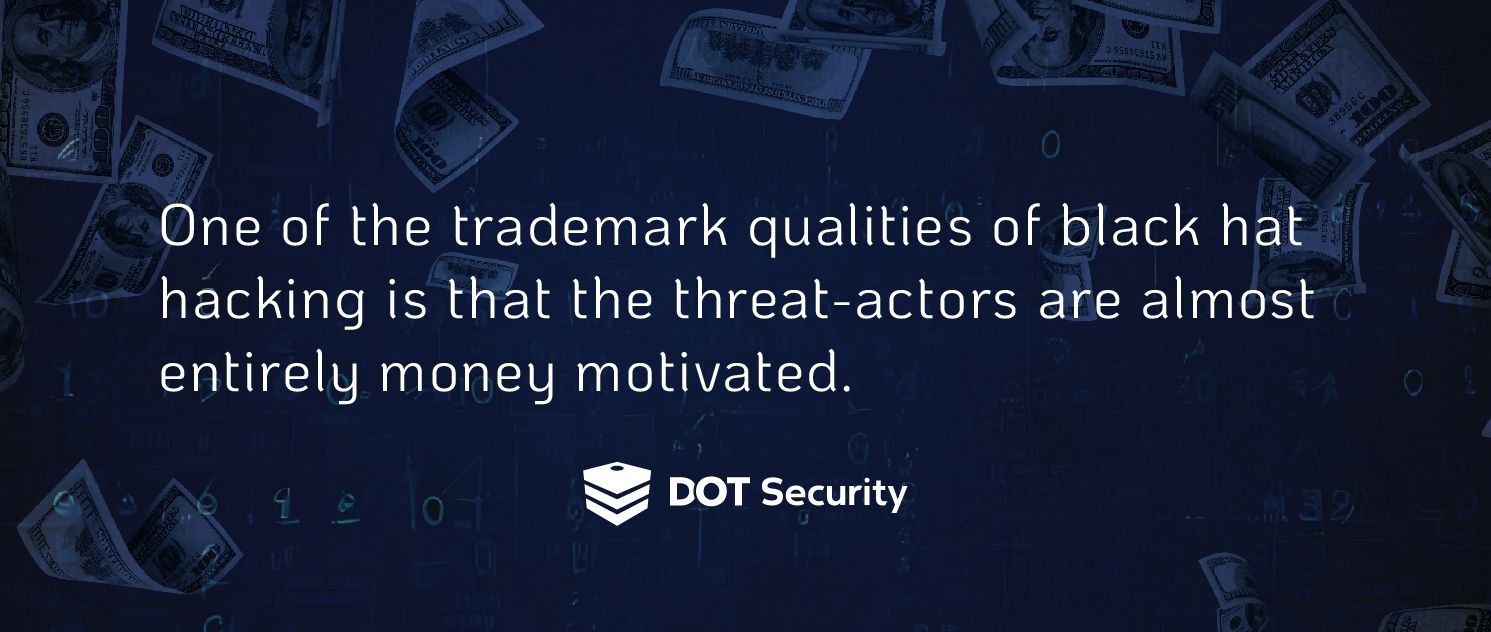Cybersecurity Consulting
What is a Black Hat Hacker?
September 19, 2024
6 minute read

A black hat hacker is what most people think of when they picture a hacker in their heads. They’re the classic evildoers who force their way into networks to cripple systems, steal data, and wreak havoc. To stop them, businesses need to understand them.
By understanding the motivations that drive black hat hackers, the techniques they use, and their goals, organizations can better protect themselves from malicious efforts and targeted cyberattacks.
Sign up for our newsletter!
Black hat hackers aren’t the only hackers out there, though, and knowing the difference between hacker types is helpful when working to improve your cybersecurity posture. In this blog, we’ll cover exactly what a black hat hacker does, the ways in which they launch attacks, how they differ from other types of hackers, and how organizations can best defend themselves.
To get an idea of how your cybersecurity strategies measure up to industry standards and best practices, review DOT Security’s Cybersecurity Checklist: How Covered Is Your Business?
Black Hat Hacker Definition
A black hat hacker is defined as someone who attempts to infiltrate a computer system by exploiting vulnerabilities with the intent to do harm. These hackers only have malicious intent and aim to benefit from the damage they cause. Oftentimes black hat hackers launch their attacks in pursuit of a financial gain.
With that in mind, black hat hackers will use a variety of tactics to leverage victims into paying. Some of these tactics include using ransomware, taking systems offline entirely, siphoning critical information for resale on the dark web, or even disrupting finances.
White hat hackers live on the other side of this hill, however, and work to help organizations defend themselves.
Black Hat vs. White Hat Hacker
White hat hackers, also sometimes known as “ethical hackers,” use similar tactics to black hat hackers but with the goal of helping organizations reinforce their cybersecurity postures.
While black hat and white hat hackers use similar methods, these groups are essentially direct opposites.
In terms of what they actually do, black hats and white hats achieve their goals through similar means. Both use the latest strategies to crack the network security systems of businesses and individuals.
The main difference is what they do once they’ve broken in. While a black hat hacker looks for ways to steal data, spy on users, or activate malware, a white hat hacker notes the weaknesses or gaps they found in the security systems and then helps their client address them so they aren’t vulnerable to a future attack.
Many cybersecurity organizations employ teams of white hat hackers, also known as a red team. They stay updated on the latest technology and use that knowledge to perform penetration tests and other network audits. These exercises have proven extremely beneficial in identifying and neutralizing system vulnerabilities.

Other Types of Hackers
Black hat and white hat hackers are certainly the most well-known of the hacker categories. However, there are a few other classifications who have their own styles and motivations.
Grey Hat Hacker
Definition: Grey hat hackers force their way into business systems the same way a black hat hacker would, but with the intent of fixing the problem for a small fee.
This is morally dubious because grey hat hackers don’t act with permission to do this like a white hat hacker, and it’s not entirely with good intentions in mind. If an organization decides they do not want to pay the grey hat hacker, that hat may turn black.
Red Hat Hacker
Definition: A red hat hacker is someone who attempts to stop black hat hackers through counterattacks and other aggressive means of destroying a malicious hacker's resources.
Red hat hacking is essentially the idea that the best defense is a good offense. Rather than implementing a comprehensive cybersecurity posture that makes use of sophisticated technology, proven processes, and expert professionals, red hat hacking aims to render black hat hackers incapable by disabling their systems.
Green Hat Hacker
Definition: Green hat hackers are usually new to the cybersecurity world. They’re not necessarily affiliated with an organization, but are looking to hone their skills more than affect real change. They usually don't have any formal hacking skills or education.
The green hat categorization is a reference to novice hackers who are really just looking to learn, improve, and find their place in the wild world of hacking.
Blue Hat Hacker
Definition: Blue hat hackers are hired to look for flaws or vulnerabilities in unreleased products or software. Blue hat hackers are often hired by cybersecurity firms to assist with penetration testing on new products or services being developed.
The above is the most common definition for blue hat hacking, though it will sometimes be used to refer to a more freelance based hacker looking to take on a single project at a time.
How Do Malicious Hackers Attack Businesses?
Black hat hackers will utilize every attack vector that they can to accomplish their goals. This means businesses need to be aware and up to date on the most common cyberattacks of the day, while also preparing a strategy to address cyberattacks, breach attempts, or other incidents.
Here’s a look at some of the most common hacking tactics:
- Keylogging: A keylogger, as the name suggests, logs the keystrokes a user makes. This allows black hat hackers to easily pick out their victim’s login credentials and use them to get into an organization’s network.
- Phishing: Phishing is a type of social engineering attack in which a victim is manipulated into clicking a link or downloading an attachment that contains malware.
- Ransomware: A bad hacker gets software into their victim’s network that encrypts or otherwise blocks the owner’s access to their own data, and then promises to release it back to them for a fee or ransom. Hence the name, ransomware.
- Distributed Denial of Service (DDoS): An attacker floods their target server with traffic, overwhelming its bandwidth so the intended users can’t get in and access their information or services.
- Malware: This is a broad umbrella term for any software that performs malicious actions on a victim’s network. Malware can steal anything from passwords to money, often before the victim even knows it’s installed on their computer.
Understanding the various ways that hackers will attempt to infiltrate your network will help you better position your cybersecurity strategies so that you can protect the sensitive information of your organization and your employees.
What Is a Black Hat Hacker’s Motivation?
For black hat hackers, the driving motivation could be any number of things, including:
- Financial: The most common goal for black hat hackers, a financially motivated attack is performed simply to make money. They can accomplish this by stealing data to use as blackmail or hold for ransom, selling data on the dark web, selling data to competitors, or tricking people into giving up their financial information.
- Political: Sometimes hackers take it into their own hands to expose information about a political figure or government activities they deem important for the public to see.
- Revenge: Business isn’t personal, but hacking can be. Sometimes a hacker will attack simply to right a perceived wrong by locking devices or deleting and stealing data.
- Corporate Espionage: Believe it or not, some companies will hire hackers to launch attacks on competitors. This is a highly illegal but realistic threat. Often the goal of these attacks is to steal confidential data or cripple a critical system.

By diving further into the psyche of black hat hackers, we’re able to uncover important insights into the way they think, why they attack, and how we can better defend our networks from malicious efforts.
Black Hat Hacking as a Business
The economy of cybercrime operates much like a traditional business, but in the shadows of the internet. And black hat hackers are key players in this economy. The cybercrime market is vast, with illicit markets for stolen data, malware like ransomware-as-a-service, and hacking tools thriving on the dark web.
Black hat hacking itself has become highly professionalized, with hacker groups operating like companies. Some provide "hacking-as-a-service," offering tools and expertise to less-skilled criminals. There are even underground marketplaces where malware, zero-day exploits, and phishing kits are bought and sold, often bundled with customer support.
Cybercrime networks also use cryptocurrencies to anonymize transactions, making it harder for law enforcement to track their activities. This economy fuels an ongoing cycle of attack and innovation, as cybercriminals continually develop new ways to exploit vulnerabilities while evading detection and retaliation.
Wrapping Up on Black Hat Hackers and Other Hacker Categories
With black hat hackers roaming the web, it’s never safe for businesses to let their guard down. In a world where hackers know most businesses don’t have a thorough cybersecurity strategy in place, it’s crucial to be the one that’s too well-protected to go after in the first place.
You can protect yourself best by implementing a layered cybersecurity strategy and working with a team of specialists who monitor and defend your network. By installing a layered cybersecurity strategy into your organization, you’ll have a much better chance at identifying, isolating, and neutralizing cyber threats before they can cause any real damage.
Is your business prepared to handle the threat of these malicious hackers? Use DOT Security’s Cybersecurity Checklist: How Covered is Your Business?—to see what cybersecurity measures you may still need to protect yourself from black hat hackers today.
